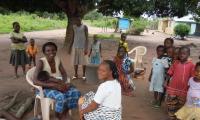Grundlæggende elementer i det danske demokrati er i forværring
Democratic values like gender equality, religious freedom and an effective Parliament is on the decline in Denmark, a recent survey shows. Experts and politicians meet to debate Danish democracy and global democracy support.

COPENHAGEN – The International Institute for Democracy and Electoral Assistance (International IDEA) and the Danish Institute for Parties and Democracy (DIPD) will host a panel exploring themes related to the state of democracy in Denmark and around the world.
Is democracy as a form of government seriously ill? Half the democracies in the world suffer from democratic erosion and the number of countries affected has almost tripled in the last decade. The panel discussion will offer the public an opportunity to explore the challenges of democracy and how to tackle them. And what could Danish democracy support look like to effectively address these challenges?
Kevin Casas-Zamora, Secretary-General of International IDEA, will give the keynote speech at the event.
“The struggle to advance democracy cannot and should not be a solitary endeavor. The Global State of Democracy is just one example of how we try to ensure that there is comparative, fact-based, objective knowledge available to those in the trenches, building, strengthening or advancing democracy around the world,” says Kevin Casas-Zamora.
The debate will also feature Rasmus Prehn, Minister for Development Cooperation, Michael Aastrup Jensen, Deputy Chair of Foreign Policy Committee, Kasper Sand Kjær, Chair, DIPD, Anne Sophie Callesen, Spokesperson for development for the Social Liberal Party, Lisbeth Knudsen, Chief Editor and Chair for the Democracy Commission and Malte Frøslee Ibsen, PostDoc, University of Copenhagen.
Most of the world’s population now lives in some form of democracy. However, the quality of democracy has eroded across all regions of the world and its value is more contested than ever. Voters are lured by populist alternatives and their simple solutions to complex global social-economic challenges. This is the assessment of the recently published International IDEA Global State of Democracy (GSoD) Indices, which measure democratic performance for 158 countries from 1975 until today and help monitor progress on the Sustainable Development Goals.
In Denmark, The Danish Institute for Parties and Democracy is the framework for international democracy-support carried out by the parties in Parliament. Executive director Lisbeth Pilegaard says:
“We cannot take democracy for granted. There is a number of growing threats to democracy worldwide. In Denmark, we see decrease in memberships of political parties and though we enjoy high turn-outs in elections, we should also reflect on how to strengthen democratic infrastructure.”
According to the International IDEA’s Global State of Democracy, Denmark is part of a select group of 21 countries in the world that scores high on all five key democratic attributes set out in the report. Denmark scores well above the other Nordic countries in Direct Democracy and somewhat above the other countries on Freedom of Expression, Access to Justice, and Social Group Equality (together with Norway). However, the dimension of Denmark’s democracy that has seen the greatest decline in recent years is Freedom of Religion. Denmark’s score has gone from 0.96 (then among the top 25 per cent in the world) in 2014 to 0.79 in 2018.
Compared to the other Nordic countries (Norway, Finland and Sweden), Denmark scores below them on Freedom of Religion, Gender Equality and Effective Parliament.
The International Institute for Democracy and Electoral Assistance
The International Institute for Democracy and Electoral Assistance (International IDEA) is an intergovernmental organization with the mandate to support and advance democracy worldwide. International IDEA contributes to the public debate on democracy and assists in strengthening process, reforms, institutions and actors that build, advance and safeguard democracy, with a focus on electoral processes; constitution-building processes; and political participation and representation. Mainstreamed across all of our work is gender and inclusion, conflict sensitivity and sustainable development.
For more information, visit www.idea.int
The Danish Institute for Parties and Democracy
Founded in 2010, DIPD is the framework for international democracy-support carried out by the political parties in the parliament. The budget of DIPD is approx. 30 million DKK pr. year. www.dipd.dk.
Media Contact:
Anna Pia Hudtloff, Head of Communications, DIPD, +45 31315940, aph@dipd.dk
This page is also available on the english site. Click on english in top menu.